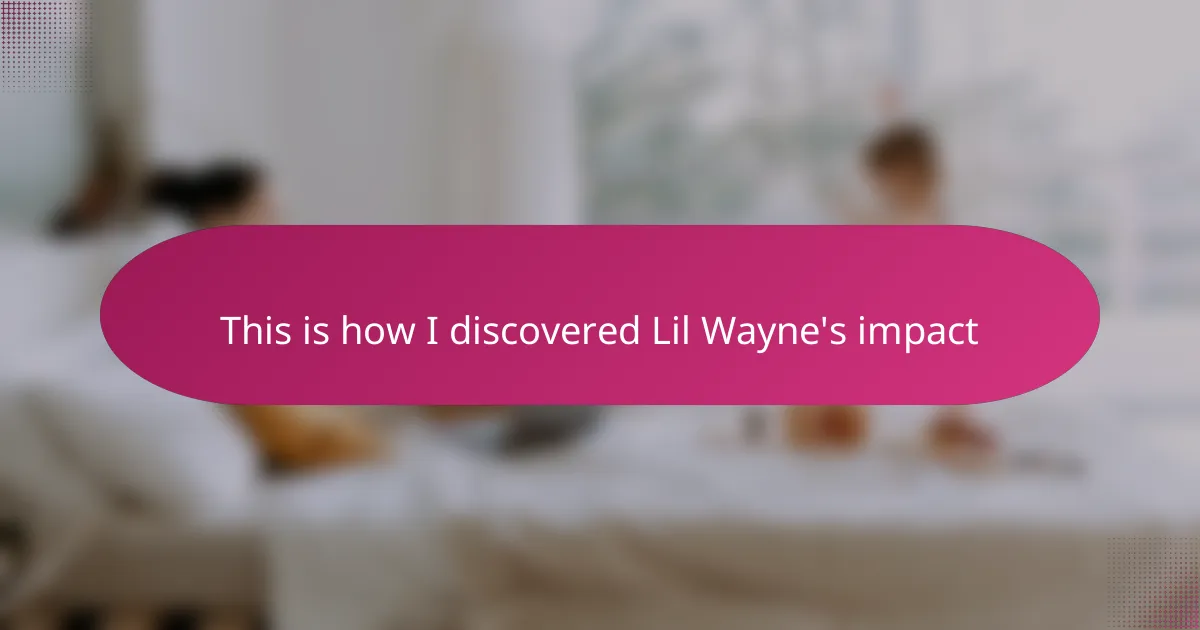Key takeaways
- Rap music has evolved from its 1970s Bronx origins into a powerful cultural movement emphasizing storytelling and social change.
- Key figures like Lil Wayne have transformed rap by pushing boundaries with creative lyricism, influencing subsequent generations of artists.
- Wayne’s approach to music exemplifies the importance of authenticity and experimentation, encouraging artists to forge their own paths.
- Listening to Wayne’s work illustrates the impact of personal connection and vulnerability in music, making it both enjoyable and thought-provoking.
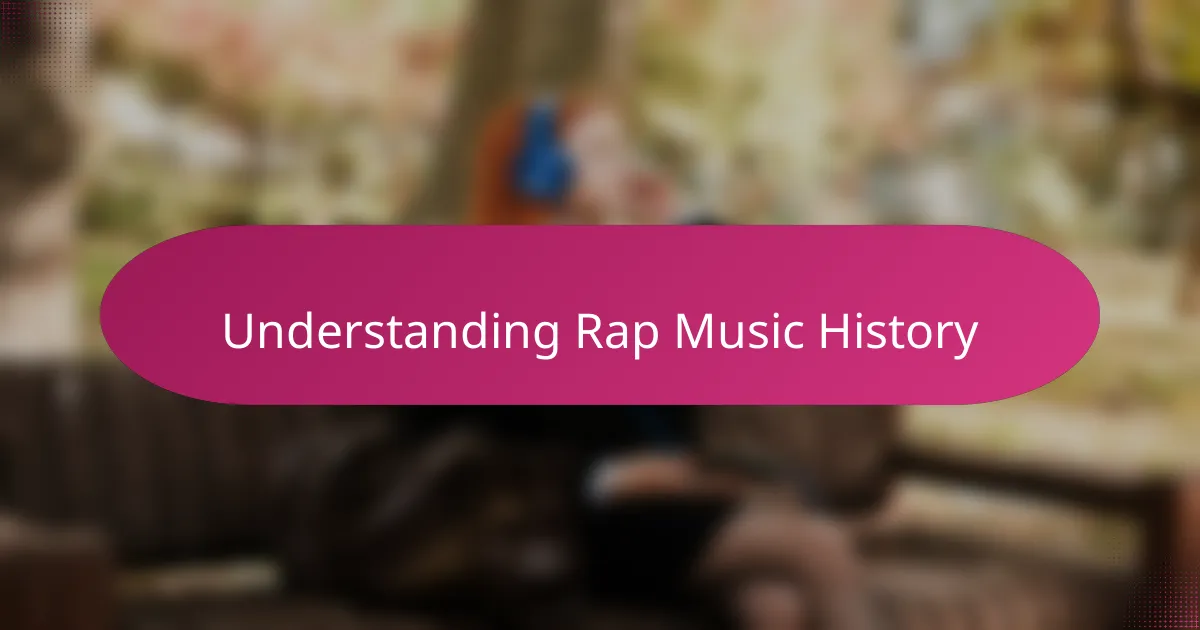
Understanding Rap Music History
Rap music has always been a powerful reflection of life’s realities, stretching back to the streets of the 1970s Bronx. I remember diving into old vinyls and feeling how raw and real those early beats and rhymes were—there’s something electric about knowing where this all started.
Have you ever wondered why rap resonates so deeply with so many people? For me, it’s the storytelling and the courage to speak truth, often against overwhelming odds. That’s the heartbeat that connects every era of hip-hop, from its origins to today’s artists.
Exploring rap’s history helped me understand the evolution of style, language, and cultural influence, turning what seemed like just “music” into a powerful movement. It wasn’t just sounds—it was a voice for change and identity, something I’ve come to appreciate more personally with every track I listen to.
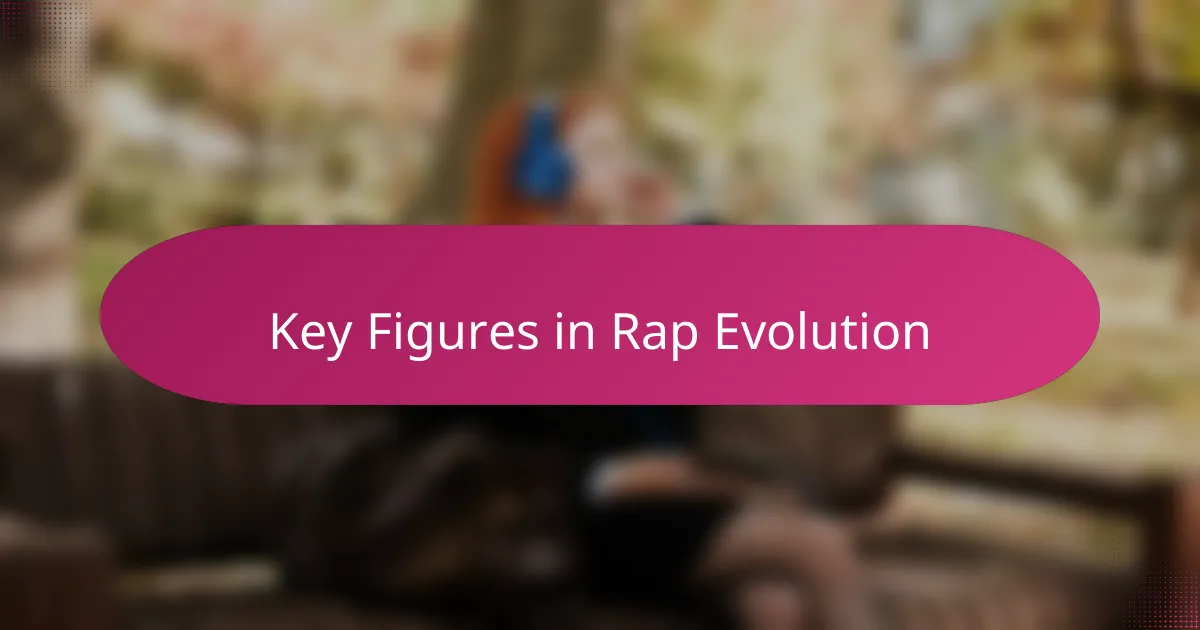
Key Figures in Rap Evolution
When I look back at the key figures in rap evolution, names like Grandmaster Flash, Rakim, and Tupac immediately come to mind. These pioneers didn’t just make hits—they reshaped the entire culture, pushing rap from block parties to global stages. Have you ever felt how their words carry weight beyond music, almost like a shared history told through rhythm?
What fascinates me most is how each icon introduced something fresh. Take Rakim’s intricate lyricism or Tupac’s raw emotion—they weren’t just entertainers; they were storytellers capturing the struggles and dreams of their communities. Experiencing their music made me realize rap is a living narrative, constantly evolving but rooted in real human experience.
It’s also incredible how these figures influenced each other across generations. I’ve often thought about how Lil Wayne, for instance, blends the street-smart grit of his predecessors with his own unique style, creating something both familiar and intensely original. It’s in tracing these connections that rap’s true evolution becomes clear to me.
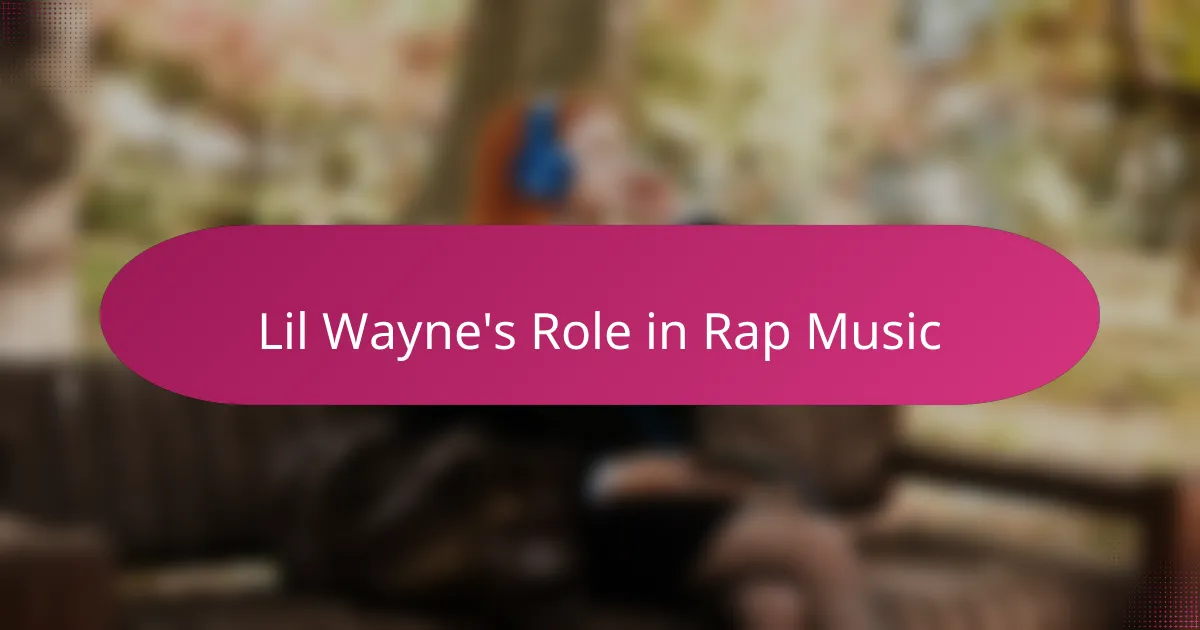
Lil Wayne’s Role in Rap Music
Lil Wayne’s role in rap music is hard to overstate. I remember the first time I really noticed his style—it was like hearing a storm of clever wordplay and raw energy all at once. Have you ever caught yourself rewinding a line just to catch every punch and hidden meaning? That’s the kind of impact he has, constantly pushing boundaries with his lyricism.
What strikes me most about Wayne is how he transformed mixtapes from simple promotional tools into full-blown artistic statements. Back when I was obsessed with those underground releases, his creativity and relentless flow made me realize that rap didn’t have to fit a mold—it could be experimental and still connect deeply with listeners. His influence reverberates in so many artists today, and I see that as a testament to how he changed the game.
I also can’t ignore how Lil Wayne’s voice became a bridge between generations. To me, he’s part poet, part rebel, and part innovator. He embodies that fearless spirit of rap’s roots while carving out his own space in the modern scene. Isn’t that the essence of what great rap artists do—honor the past but keep forging ahead? That balance is what makes his role so enduring.
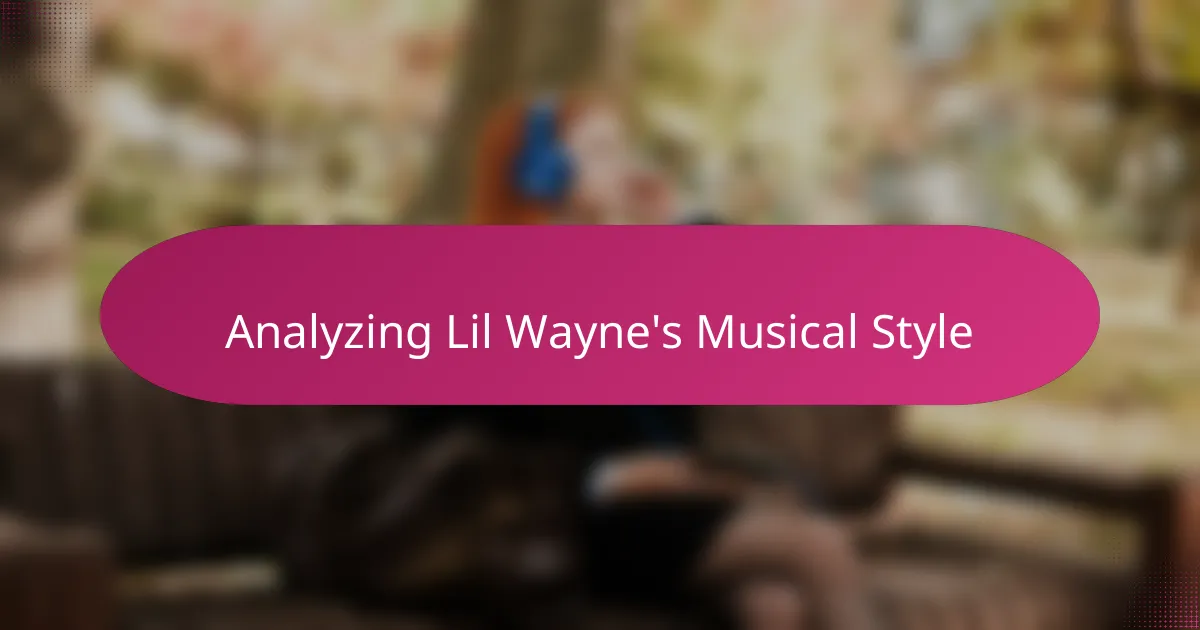
Analyzing Lil Wayne’s Musical Style
Lil Wayne’s musical style struck me first with its sheer originality—his voice cracking with a distinct rasp, delivering lyrics that twist and turn like intricate puzzles. Have you ever found yourself hanging on every syllable, caught between trying to catch all the clever wordplay and just vibing with the rhythm? That blend of complexity and catchiness made me realize how deeply personal his style really is.
What really fascinates me is his fearless experimentation. Wayne isn’t confined by traditional rap structures; he bends beats, slows down flows, and throws in unexpected metaphors that make you pause and think. I remember one track where his voice felt almost melodic, floating over a beat that felt like it was from another world—he challenged my expectations and expanded what I thought rap could be.
Then there’s his ability to switch moods effortlessly—from aggressive bars to introspective moments—reflecting a wide emotional range. This versatility made me see him not just as a rapper but as a storyteller who invites listeners into his world, raw and unfiltered. Isn’t that what great music should do, after all? It made me appreciate not just his talent but his courage to be unapologetically himself.
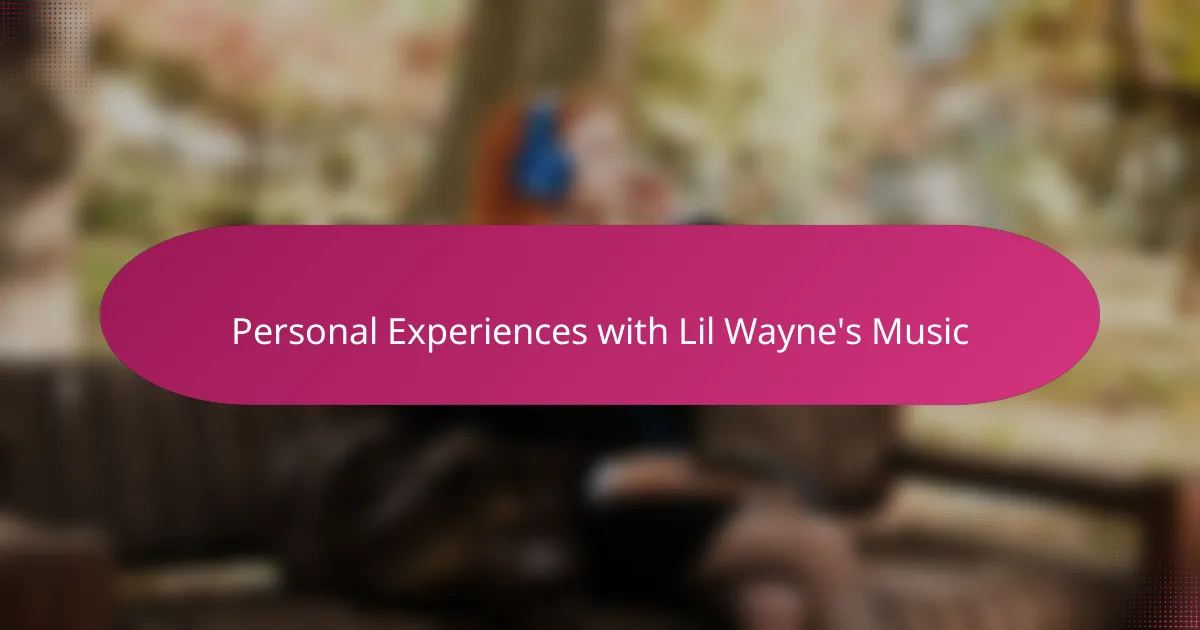
Personal Experiences with Lil Wayne’s Music
I still remember the first time I played Lil Wayne’s “Tha Carter III” all the way through—it was like I’d uncovered a whole new world of rap. How often do you find an album that feels both chaotic and carefully crafted? That experience hooked me, making me want to dissect every verse and uncover the layers beneath his rapid-fire flow.
There was a night during a long drive when “Lollipop” came on the radio, and I couldn’t help but sing along, caught between the catchy hook and the clever twists in his lyrics. Have you ever found a song that gets stuck in your head but also makes you think? That balance Wayne strikes made me realize how music can be both fun and thought-provoking, a rare combo in rap.
Over time, Wayne’s mixtapes became my go-to escapes, each one a snapshot of his mindset at the moment. Listening to those felt like tuning into a private conversation—sometimes wild, sometimes vulnerable. It made me see him not just as a rapper but as a relatable human navigating fame, struggles, and creativity all at once. Isn’t that what true artistry is about?
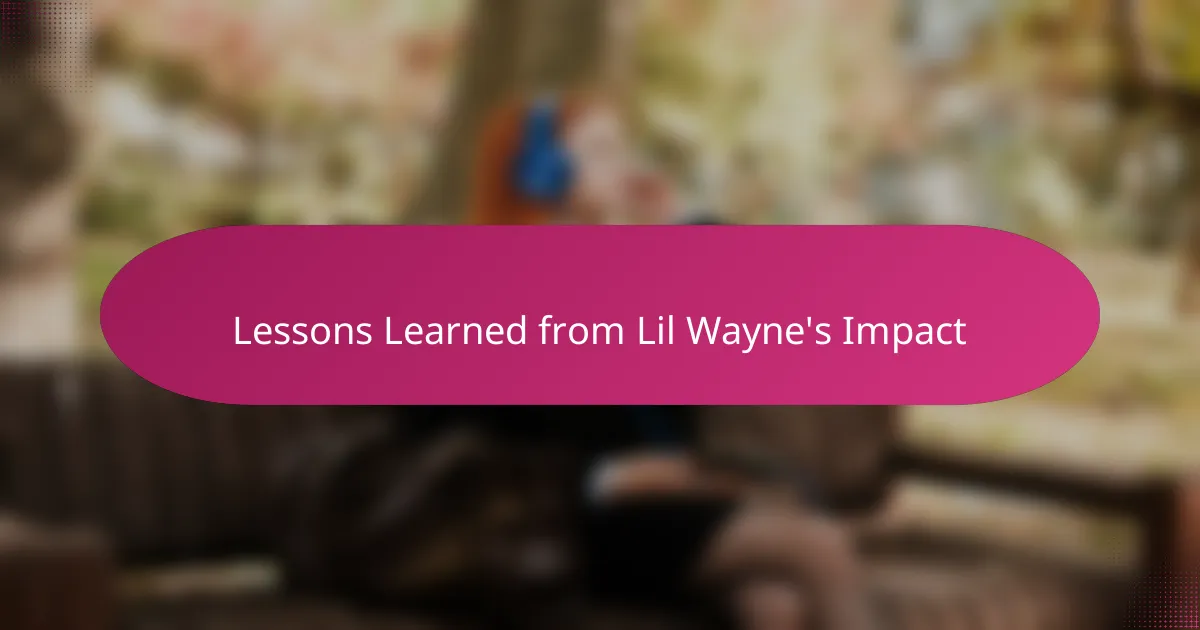
Lessons Learned from Lil Wayne’s Impact
What I learned most from Lil Wayne’s impact is how vital it is to stay true to your voice, no matter how unconventional it might seem. Have you ever felt pressure to fit into a certain style but sensed that breaking free could lead to something greater? Wayne’s fearless approach taught me that authenticity resonates louder than perfection.
Another lesson came from watching how he redefined success beyond mainstream charts. His mixtape hustle showed me that creating unapologetically and connecting directly with your audience can be just as powerful. I remember thinking, isn’t that what real artistry is—finding your own path and inspiring others to do the same?
Finally, Lil Wayne’s career reminded me that influence isn’t just about flashy hits but about shaping culture over time. His willingness to experiment and take risks made me realize that the legends we admire often become that way because they’re willing to evolve and challenge norms. Doesn’t that make you appreciate the courage behind every groundbreaking moment?
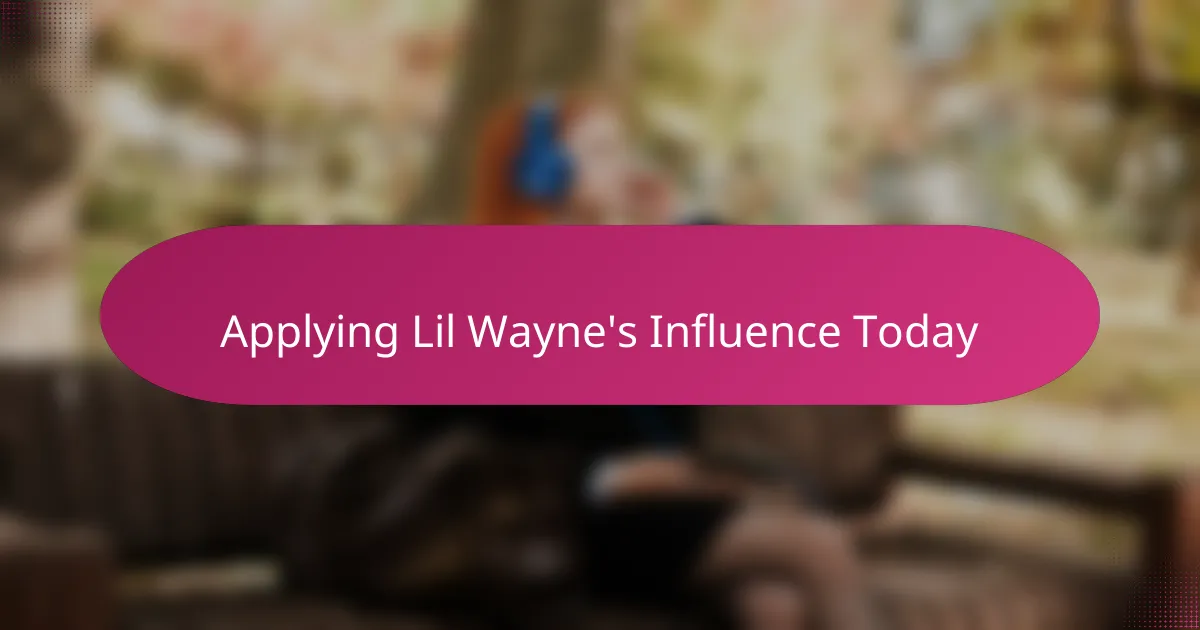
Applying Lil Wayne’s Influence Today
Applying Lil Wayne’s influence today means embracing creativity without boundaries. I’ve noticed how many emerging artists channel his fearless experimentation, blending unexpected flows and punchlines that keep listeners hooked. Isn’t it inspiring to see someone break the mold and encourage others to find their unique voice?
On a personal level, I often try to apply Wayne’s lesson of authenticity. When I write about music or life, I remind myself that being true, even if it feels risky, connects more deeply with people than simply following trends. Have you ever experienced that moment when honesty in expression creates an instant bond with your audience? That’s exactly what Lil Wayne’s influence fosters.
Moreover, his impact shows in how artists today approach their craft—not just aiming for commercial success but building genuine connections through raw storytelling and steady hustle. Watching that unfold reminds me how powerful it is to put heart into your work consistently. Doesn’t it make you rethink what success really means in the music world?
